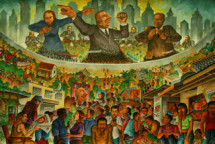Authoritarian populism and the challenge to civil society What roles can international NGOs play in an emancipatory rural politics?
Topics
This paper looks into what roles international NGOs can play in an emancipatory rural politics.

Authors
Introduction
“Imagining a new politics in and linked to rural areas is an essential political and research task. Emancipatory politics has to be generated through styles of research that are open, inclusive and collaborative, although always informed by theory and disciplined by empirical data. A commitment to emancipatory research of the rural should be situated in a deep historical perspective and attentive to hinterlands, margins and frontiers. It should be interdisciplinary, comparative and integrative, articulate the local and the global, attend to class, gender and generational dynamics, and utilise multiple approaches and methods to corroborate findings and to highlight the many different meanings and perspectives at play.” (Scoones et al. 2018, 12)
We are writing as researchers in an international NGO, Oxfam.1 Our aim is to prompt discussion of the roles that international NGOs might play in, or in relation to, an emancipatory rural politics, and how they might best do this – assuming that there is a place for them at all. We will do so by outlining some of the trajectories of our own research on populism and its implications for NGO policy and practice, including the ways in which they work with civil society and seek to influence social and economic change at different scales.
It is important to emphasise at the outset that organisations such as our own are non-partisan and do not seek political change, other than promoting good governance and policies that contribute to the reduction of poverty and suffering in different contexts, including rural areas. In addition to working with local civil society, we aim to do so in partnership with international agencies, governments, the private sector, and other NGOs. It is our ability to bridge these different sectors and scales that is arguably our greatest asset (Green 2016).
This paper was presented at the Emancipatory Rural Politics Initiative (ERPI) 2018 Conference: "Authoritarian Populism and the Rural World"